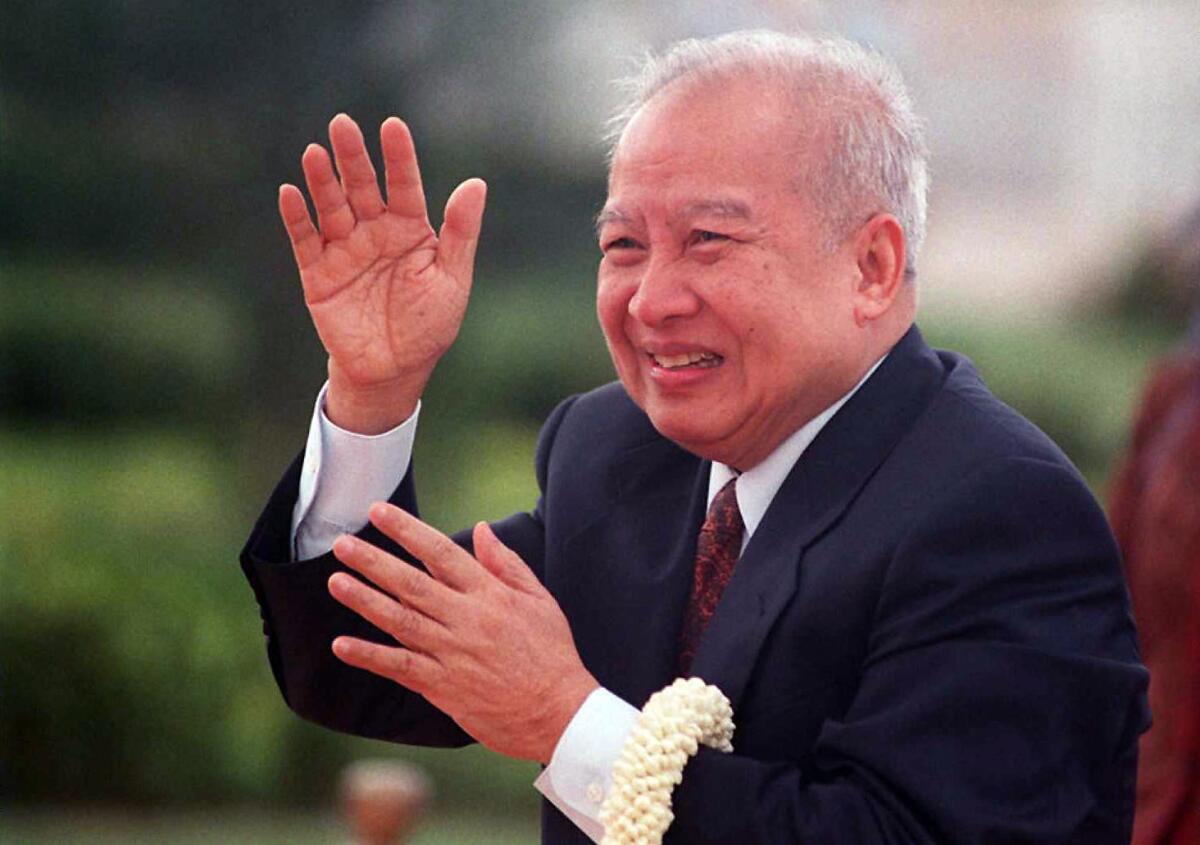Norodom Sihanouk dies at 89; former king of Cambodia

Former King Norodom Sihanouk of Cambodia, an unpredictable and crafty political survivor whose fortunes were entwined with U.S. military involvement in Indochina, died Monday of natural causes in Beijing, where he had undergone medical treatment, Chinese state media reported. He was 89.
Sihanouk had various forms of cancer, diabetes and hypertension and had sought medical care in China since 2004, when he abdicated in favor of his son due to old age and health problems. He died two weeks short of his 90th birthday.
“This is a great loss for Cambodia. We feel very sad. The former king was a great king who we all respect and love,” Cambodia’s Deputy Prime Minister Nhik Bun Chhay was quoted as telling the New China News Agency.
The news agency said reigning King Norodom Sihamoni, Sihanouk’s son, will fly to Beijing to retrieve the body and return it to Cambodia for a traditional funeral.
Long a symbol of Cambodian nationalism and independence, Sihanouk reigned more than he ruled. But for nearly 60 years, his name was synonymous with the tortured history of his sad land. He was, by any yardstick, one of Southeast Asia’s most colorful and legendary statesmen.
The portly Sihanouk, who had four wives and countless mistresses over his long career, was as much a hedonist as a political operative. He was vain, manipulative and whiny, his soprano voice a singsong of French and English as he uttered declarations and cut deals to play foreign powers against each other.
During the Vietnam War, Sihanouk leaned toward the Communists, anticipating their victory. He cut ties to Washington in 1965 to protest the U.S. military buildup in Vietnam but let U.S. and South Vietnamese forces conduct secret incursions into Cambodia to disrupt the supply lines that Sihanouk had allowed the Communists to set up.
Sihanouk was born Oct. 31, 1922, to Norodom Suramarit and Kossamak Nearireath. He was educated in Saigon, now called Ho Chi Minh City, and Paris, and ascended to the throne in 1941 at the age of 18, after the death of his uncle, the king. He was the handpicked choice of colonial France, which believed he would be the most malleable of the royal pretenders.
But 12 years later he went into “voluntary exile” to protest French imperialist control, creating so much international pressure that in 1953 the French government granted Cambodia the independence he sought. In 1955, Sihanouk abdicated in favor of his father to pursue political power free from royal constraints. He set up the Popular Socialist Community party, which within months had captured all the seats in the National Assembly.
Sihanouk loved center stage. He called the Cambodians “my children” and would receive virtually any commoner who wanted to complain about the price of seed or comment on an irrigation project. At night he might entertain dignitaries and diplomats at his palace with a champagne banquet and a moonlight performance of the Royal Ballet.
His guests never knew what to expect. At one banquet he grabbed the microphone, went to his knees and sang the Frank Sinatra standard “My Way.” Another time he insisted that Richard H. Solomon, a U.S. assistant secretary of State, sing “Happy Birthday” to him — which an embarrassed Solomon did. Sihanouk also made amateur films of love stories and mysteries, in which he was star, director, writer and narrator. Guests sometimes had to sit for hours watching them.
“It is like Shakespeare, n’est-ce pas?” he asked after one screening.
Sihanouk spent much of the 1960s trying to maintain Cambodia’s neutrality, and his desire to keep his country out of the Indochina conflict set him on a collision course with U.S. officials, who often were publicly disdainful of him. One ambassador, Robert McClintock, while opening a U.S.-sponsored maternity clinic, turned to the prince at the ceremony and said, “This should particularly interest you as a great one-man manufacturer of babies.”
Sihanouk would regret his 1965 decision to sever diplomatic ties with the United States. Without U.S. aid, the Cambodian economy rapidly deteriorated, sowing seeds of political instability. To compensate and gain leverage with Washington, he turned to Beijing. Chinese Premier Chou En-lai visited Cambodia in 1968 while the Vietnam War raged across the border.
By then, Cambodia had become a major staging area for North Vietnamese troops. In 1969, President Nixon ordered secret B-52 airstrikes against the Communist camps and supply lines. The next year, on April 30, U.S.-led allied forces began overt incursions into Cambodia, drawing the kingdom into the war and fueling antiwar protests in the United States.
Sihanouk, who ruled as an autocrat, crushing dissent and closing newspapers, was on a trip to Moscow in 1970 when he was overthrown by his U.S.-backed minister of defense, Lon Nol. Sihanouk, who firmly believed that Washington had masterminded the coup, went to Beijing in exile after he was sentenced to death in absentia by Lon Nol’s regime. The Chinese treated Sihanouk royally, providing a mansion, nine servants and a $300,000-a-year allowance.
In Beijing, Sihanouk aligned himself with Pol Pot’s Khmer Rouge, who were fighting to overthrow Lon Nol. Sihanouk was not comfortable with the relationship but wanted to keep his name at the forefront of Cambodian affairs. In a visit to the United Nations with Khmer Rouge officials, Sihanouk tried to pass a message appealing for help to an FBI agent in a New York elevator. The agent, mistakenly thinking he was being tipped, wouldn’t take the note.
Sihanouk returned to Phnom Penh in 1975, after the Khmer Rouge’s peasant army had taken control of Cambodia. But the prince and his wife, Monique, were placed under house arrest in his palace by Pol Pot. Only personal intervention by Chou, the Chinese premier, saved them from execution, diplomats said.
Between 1975 and 1979, when Pol Pot was overthrown by invading Vietnamese troops, the Khmer Rouge killed more than 1 million people, including 14 members of Sihanouk’s family. In 1979, the Chinese evacuated Sihanouk to Vietnam, where he held a six-hour news conference to denounce both the Vietnamese and the Khmer Rouge.
His country now occupied by the Vietnamese, Cambodia’s long-standing enemy, Sihanouk became a worldly wanderer once more. He divided his time between China and North Korea, where he developed a close friendship with late leader Kim Il Sung. Sihanouk returned to Cambodia occasionally in the ensuing years, issuing contradictory and confusing declarations, but a generation of warfare had devastated the Cambodian economy, destroyed its political infrastructure and spiritually crippled its people.
The United Nations spent $2.6 billion and sent 26,000 troops to Cambodia in the early 1990s to prepare for the return of democracy. When the mission, an apparent success, ended in September 1993, Sihanouk startled the world by returning to Phnom Penh and reclaiming the crown he had given up 38 years earlier. It was, Asian scholars said, one of the great political comebacks of the 20th century.
“What I want is not to become king again,” Sihanouk said. “In my opinion, the greatest honor, the greatest reward that the nation, that history can offer me is to be the father of the nation, the father of independence, the father of peace, the father of democracy and genuine freedom. I am not at all seeking a reward in being crowned. The crown is very heavy, you know. It hurts your head.”
Sihanouk’s son, Prince Norodom Ranariddh, whom the king always considered weak and indecisive, became prime minister after the 1993 general elections. But Ranariddh was overthrown in July 1997 by a former Khmer Rouge, Hun Sen, who had muscled his way into a position as co-prime minister. More instability, bloodshed and economic ruin followed.
Sihanouk, ailing with prostate cancer, spent most of his last years in Beijing. His people continued to revere him as a god-king in the 1,000-year tradition of the Angkor Empire—the monarchy was, after all, the only institution they were still able to believe in — but Sihanouk seemed increasingly distant and depressed by the belief that every national aspiration he had worked for failed.
“If I was not a Buddhist, I would commit suicide because the end of my life is full of shame, humiliation and desperation of the national order,” he said in late 1997.
“In a blossoming Asia . . . we are the only oasis of war, insecurity, self-destruction, poverty, social injustice, arch-corruption, lawlessness, national division, totalitarianism, drug trafficking and AIDS.”
Lamb is a former Times staff writer.
Times staff writer Barbara Demick in Beijing contributed to this report.
More to Read
Start your day right
Sign up for Essential California for the L.A. Times biggest news, features and recommendations in your inbox six days a week.
You may occasionally receive promotional content from the Los Angeles Times.






